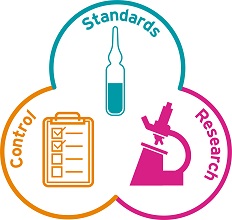Our use of animals
Biological medicines are made from biological (living) sources such as bacteria and viruses, blood or cells. They form an important part of our healthcare and cover medicines like vaccines that are routinely used to prevent disease and treat patients worldwide.
At NIBSC we develop standards and reference materials, test medicinal products and carry out scientific research, activities that are essential for making sure the biological medicines that patients receive are safe and effective.
 Our work protects public health and improves lives. For example, our experts make sure that meningitis vaccines are safe before they’re used in childhood immunisation programmes, respond to worldwide health emergencies such as pandemic flu outbreaks and are a key part of global initiatives tackling infectious diseases like Polio.
Our work protects public health and improves lives. For example, our experts make sure that meningitis vaccines are safe before they’re used in childhood immunisation programmes, respond to worldwide health emergencies such as pandemic flu outbreaks and are a key part of global initiatives tackling infectious diseases like Polio.
Find out more about NIBSC impact on public health.
To support our mission to protect and improve public health, some of our work can involve the use of animals. Our scientists will always carefully examine whether non-animal methods, such as cells in the lab or computer models, can be used to understand their scientific questions before starting a project. But in certain situations, a suitable alternative cannot be found and animals may be used to:
- Make sure that new vaccines against diseases such as polio and meningitis are safe
- Produce critical materials to support global responses to public health emergencies
- Test new ideas for treating diseases such as HIV and hepatitis C
- Investigate unwanted effects people may experience after taking biological medicines
- Confirm the activity of vaccines before they are used
We are committed to the principles of the 3Rs, which aim to replace, reduce and refine animal use, and play a leading role in many research projects looking to develop new ways to test medicines without using animals.
In January 2018, we signed the Concordat on Openness on Animal Research making a commitment to improve communications about our use of animals in scientific research and medicines testing.